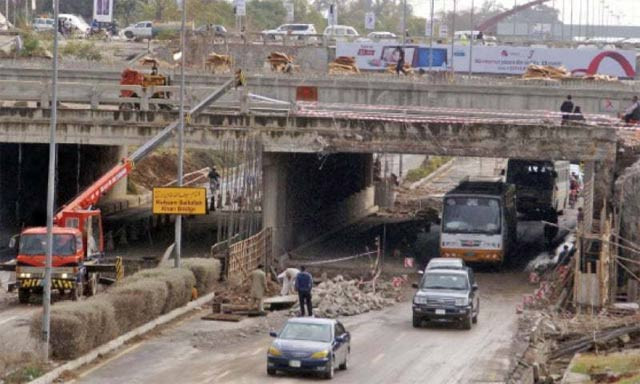Motivated by quick returns, govt overspending on infrastructure development
Sectors like education, healthcare, nutrition, sanitation being neglected

IMF, other global institutions will have shares in the bank. PHOTO: INP
Spending on ‘hardware’ has been the corner stone of the current government since 2013. Under the Extended Fund Facility (EFF) of the International Monetary Fund (IMF), the government was facing a hard budget constraint. Therefore, it could not spend the allocated amount of the development budget and curtailed it to meet the performance criteria.
Chief minister approves 6-km-long elevated expressway
In the current FY 2016-17, the government most likely spent the allocated amount as the budget constraint has become soft. Specifically, the budget constraint would be even softer in the FY 2017-18 due to electioneering.
The spending on ‘hardware’ is necessary from the perspective of economic development, but not sufficient. Developing economies do spend on hardware in the initial stages of development; however, if a country has already achieved a reasonable level of infrastructure development, it may easily focus on other grave issues.
Pakistan has achieved a decent level of infrastructure development since the government’s resolve to modernise it has started to dazzle the masses. Every passing day brings new flamboyant projects and their frequency would further increase as the elections loom closer. The project-based approach to development is the best way to lure the masses, as is already happening.
The developing economies normally face fiscal stringency and it mostly comes from current expenditure since a government cannot easily curtail these. On top of that, if a government is interested in raising the salary of public servants to appease them, then the current expenditure increases enormously. Under those circumstances, the axe falls on development expenditure.
Under the new set of conditions, policymakers need to prioritise their development spending. It should not follow a traditional pattern where projects are hastily conceived and poorly implemented. In a project-based approach, the government follows hasty decision-making and looks for quick-fix solutions. These quick-fix solutions have cost overruns and don’t fit well into long-term planning.
From a long-term perspective, spending on ‘software’ could provide better dividends to the masses. Here, software means spending on education, healthcare, nutrition, sanitation etc. The continuous neglect of software by the successive regimes is quite evident. Why software has the least priority of the successive governments?
The problem with the software is that it doesn’t provide quick returns. If a government invests in software, the dividends will be reaped by successive governments. For instance, spending on primary and secondary education normally brings dividends after 15 years. In addition, spending on healthcare will provide healthy minds, which may prove to be beneficial for future generations.
Another big problem with software is that it cannot get the attraction of masses in a country where a large chunk of people are illiterate. On the contrary, a circuitous underpass may impress a large number of people. Similarly, elevated metros and flamboyant orange lines easily get the praise from the people and even the media.
In a nutshell, the society is facing a hardware and software trade-off where the policymakers are fussing over the hardware. It seems like the country is over-investing in hardware and this over-investment has started to create software problems.
New Metro Bus Route: Construction work gains momentum
Although the roads are quite wide, yet the traffic congestion has increased. There is a dearth of traffic sense and in general civic sense. In the absence of civic sense, a wide road may create traffic problems. Last but not the least; civic sense comes through investing in software.
The writer is an Assistant Professor of Economics at SDSB, Lahore University of Management Sciences (LUMS)
Published in The Express Tribune, May 22nd, 2017.
Like Business on Facebook, follow @TribuneBiz on Twitter to stay informed and join in the conversation.



















COMMENTS
Comments are moderated and generally will be posted if they are on-topic and not abusive.
For more information, please see our Comments FAQ